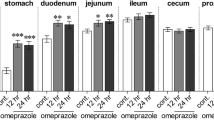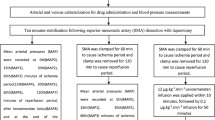Abstract
The intestinal lesions caused by ischemia and reperfusion may lead to grave sequelae. To study the efficacy of adenosine triphosphate magnesium chloride (ATP-MgCl2) and allopurinol (ALLO) in protecting the small bowel from ischemia, rabbits in two groups, 1 (n = 7) and 2 (n = 7), were pretreated with either 1 ml saline or ATP-MgCl2 just prior to intestinal ischemia and reperfusion. Group 3 (n = 7) animals recieved enteral ALLO daily for 3 days before the experiment. Using Oldham and Thompson's grading system, histologic specimens were evaluated blindly for evidence of ischemic-reperfusion injury. The histologic injury scores in group 2 were significantly lower than those in groups 1 and 3 (P <0.05 and 0.02, respectively) after 2 h of ischemia. Following 30 min of reperfusion, histologic injury scores rose significantly in group 1 (P <0.05), decreased in group 2 (P <0.005), and showed no significant changes in group 3 (P >0.50). We conclude that: (1) pretreatment with ALLO can prevent reperfusion injury of the small intestine; and (2) ATP-MgCl2 administration can reduce 2-h ischemic intestinal damage, reverse reperfusion-induced cellular injury, and improve the recovery of ischemic bowel during the reperfusion phase.
Similar content being viewed by others
References
Chaudry IH, et al (1974) Depletion and restoration of tissue ATP in hemorrhagic shock. Arch Surg 108: 208
Haglund U (1986) Toxic effects in intestinal strangulation. Pediatr Surg Int 1: 10–14
Hirasawa H, et al (1980) Improved survival, RES function, and ICG test with ATP-MgCl2 following hepatic ischemia. Surg Forum 31: 158–160
Hirasawa H, et al (1983) Experimental and clinical study on ATP-MgCl2 administration for postischemic acute renal failure. Clin Exp Dialysis Apheresis 7: 37–47
Hirasawa H, et al (1983) Improved survival and reticuloendothelial function with intravenous ATP-MgCl2 following hemorrhagic shock. Circ Shock 11: 141–148
Jin Jihuan, et al (1986) Myocardial protection with ‘ideal’ cardioplegic solution containing adenosine-triphosphate-magnesium. Chin J Anesth 6: 261–263
Ma TY, Hollander D and Freeman D (1991) Oxygen free radical injury of IEC-18 small intestinal epithelial cell monolayers. Gastroenterology 100: 1533–1543
Oldham KT, et al (1987) Treatment of intestinal ischemia with oxygenated intraluminal perfluorocarbons. Am J Surg 153: 291–294
Suttap N, et al (1986) Antioxidant defense mechanisms of endothelial cells: glutathione redox cycle versus catalase (abstract). Am J Physiol 251: C671
Thompson JS, Bragg LE, West WW (1990) Serum enzyme levels during intestinal ischemia. Ann Surg 211: 369–373
Author information
Authors and Affiliations
Additional information
Correspondence to: X.-p. Liao
Rights and permissions
About this article
Cite this article
Liao, Xp., She, Yx., Shi, Cr. et al. Comparative analysis of adenosine triphosphate-magnesium chloride and allopurinol following small-bowel ischemia. Pediatr Surg Int 9, 106–108 (1994). https://doi.org/10.1007/BF00176124
Accepted:
Issue Date:
DOI: https://doi.org/10.1007/BF00176124




